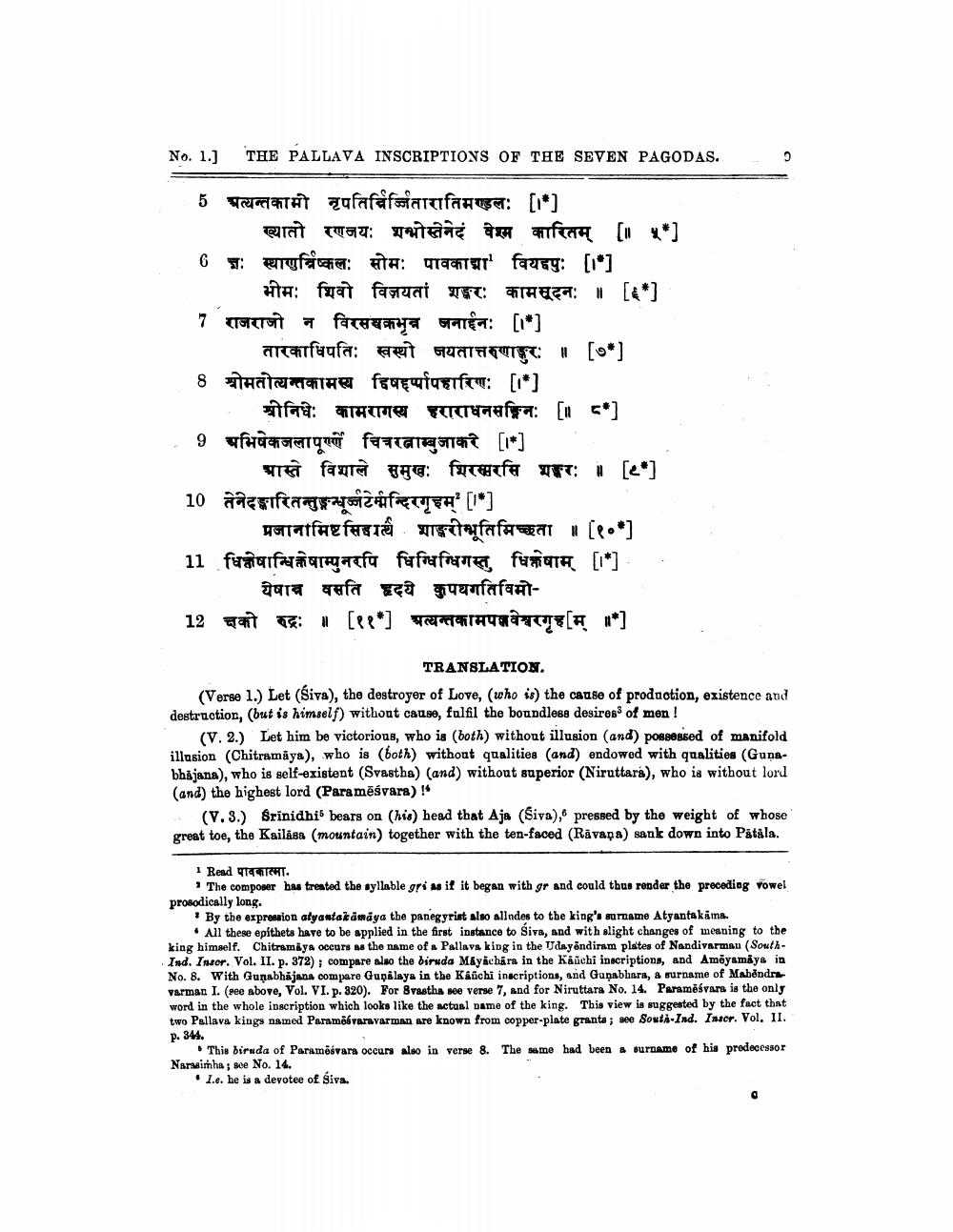________________
No. 1.]
THE PALLAVA INSCRIPTIONS OF THE SEVEN PAGODAS.
5 अत्यन्तकामी नृपतिर्विजितारातिमण्डल: []
ख्यातो रणनयः शम्भोस्तेनेदं वेश्म कारितम् ॥ ५*] ___G नः स्थाणुनिष्कल: सोमः पावकामा वियहपुः [1]
भीमः शिवो विजयतां शङ्करः कामसूदनः ॥ [*] 7 राजराजो न विरसश्चक्रभुन जनाइन: [*]
तारकाधिपतिः स्वस्थो जयतातरुणाङ्करः ॥ [*] 8 श्रीमतोत्यन्तकामस्य हिषहर्पापहारिण: [*]
श्रीनिधेः कामरागस्य हराराधनसङ्गिनः [॥ *] .9 अभिषेकजलापूणे चित्ररत्नाम्बुजाकरे [*]
भास्ते विशाले सुमुखः शिरस्मरसि शहरः ॥ [*] 10 तेनेदकारितन्तुङ्गन्धूर्जटेन्दिरगृहम् [*]
प्रजानामिष्ट सिद्धाय । शाङ्करीम्भूतिमिच्छता ॥ [१०] 11 धितोषाधितेषाम्युनरपि धिग्धिग्धिगस्तु, धितषाम् [*] .
येषाव वसति हृदये कुपथगतिविमो12 क्षको रुद्रः ॥ [११] अत्यन्तकामपनवेश्वरगृह[म् ॥*]
TRANSLATION (Verse 1.) Let (siva), the destroyer of Love, (who is) the cause of production, existence and destruction, but is himself) without cause, fulfil the boundless desires of men !
(V. 2.) Let him be victorious, who is (both) without illusion (and) possessed of manifold illusion (Chitramāya), who is (both) without qualities (and) endowed with qualities (Gunabhsjana), who is self-existent (Svastha) (and) without superior (Niruttara), who is without lord (and) the highest lord (Para mēsvara)!
(V.3.) Srinidhis bears on (his) head that Aja (Siva), pressed by the weight of whose great toe, the Kailasa (mountain) together with the ten-faced (Ravapa) sant down into Patala.
1 Read पावकारमा.
* The componer has treated the syllable gri as it it began with gr and could thus render the preceding vowel prosodically long.
By the expression atyanta amaya the panegyrist also alludes to the king's surname Atyantakama.
• All these epithets have to be applied in the first instance to Siva, and with slight changes of meaning to the king himself. Chitramiya occurs as the name of a Pallava king in the Udayondiram plates of Nandivarmau (SouthInd. Insor. Vol. II. p. 372); compare also the biruda Máyáchåra in the Kächi inscriptions, and Amoyamiya in No. 8. With Gunabhajans compare Guņklaya in the Kanchi inscriptions, and Guņabhara, a murname of Mahendra varman I. (see above, Vol. VI. p. 320). For 8vastha see verse 7, and for Niruttara No. 14. Paramośvara is the only word in the whole inscription which looks like the actual name of the king. This view is suggested by the fact that two Pallava kings named Paramövaravarman are known from copper-plate granta; see South-Ind. Inser. Vol. 11. p.346
This birsda of Paramosvara occurs also in verse 8. The same had been & surname of his predecessor Narasimha; see No. 14.
I.e. he is a devotee of siva.




